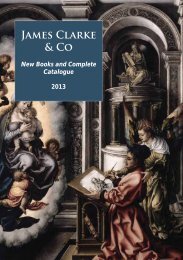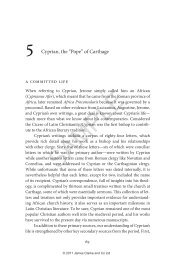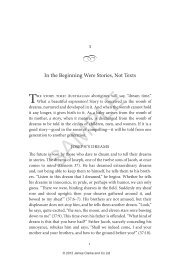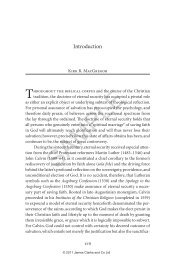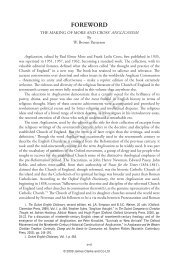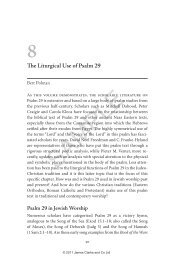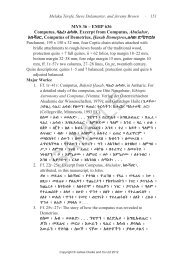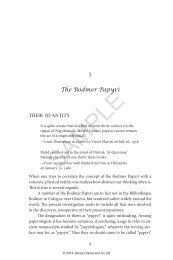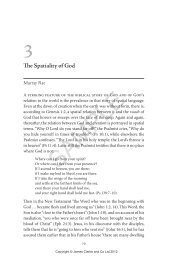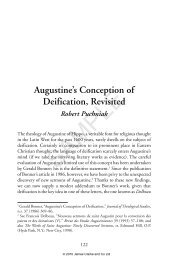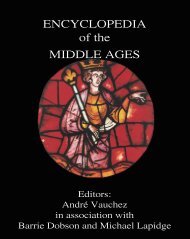Extract from Chapter 1 - James Clarke and Co Ltd
Extract from Chapter 1 - James Clarke and Co Ltd
Extract from Chapter 1 - James Clarke and Co Ltd
Create successful ePaper yourself
Turn your PDF publications into a flip-book with our unique Google optimized e-Paper software.
58 MUSING WITH CONFUCIUS AND PAUL<br />
dialogues or sayings. Most of the sayings are concerned with political<br />
ethics <strong>and</strong> with the cultivation of virtue. 9<br />
9. The result of the redaction process is the work we have today that has titles to every<br />
book (or section). Below are the titles of the books <strong>and</strong> their component sections with a<br />
brief summary of their content in parenthesis:<br />
Book 1–2: The sayings of <strong>Co</strong>nfucius <strong>and</strong> his disciples<br />
Book 1: Xue Er—On Learning (On studying, life, language, truth, etc.)<br />
Book 2: Weizheng—On Governing (On government, poetry, <strong>Co</strong>nfucius’ own life<br />
of study, junzi [exemplary person], etc.)<br />
Book 3–9: <strong>Co</strong>re Books (Probably the earliest material with topical discussions)<br />
Book 3: Bayi—Eight Rows of Dancers (On ritual <strong>and</strong> music)<br />
Book 4: Liren—To Live Benevolently/Humanely (Aphorism on ren)<br />
Book 5: Gongye Chang—Gongye Chang (A major disciple of <strong>Co</strong>nfucius,<br />
contains sayings on judgment about others)<br />
Book 6: Yong Ye—Yong Ye (a major disciple of <strong>Co</strong>nfucius, also known as Ran<br />
Yong or Ran Bo-niu, a discussion on judgment <strong>and</strong> official<br />
responsibility)<br />
Book 7: Shu Er—To Transmit (Biographical material on <strong>Co</strong>nfucius)<br />
Book 8: Tai Bo—Tai Bo (The eldest son of the Zhou dynasty’s first king; contains<br />
Master Zeng’s analects [chap. 3–7] <strong>and</strong> a discussion on the sage kings<br />
[chap. 18–21])<br />
Book 9: Zihan—Master Seldom (The title is based on the first two words of the<br />
book, “The Master seldom . . . ” The book contains biographical material<br />
of <strong>Co</strong>nfucius.)<br />
Book 10–11: Topical Discourses<br />
Book 10: Xiang Dang—Native Place (On <strong>Co</strong>nfucius’s behavior in his native region<br />
<strong>and</strong> maxims concerning ritual.)<br />
Book 11: Xian Jin—Those Who First Entered (On rituals, music, <strong>and</strong> government)<br />
Book 12–20: Dialogues between the Disciples <strong>and</strong> the Master<br />
Book 12: Yan Yuan—The disciples ask about ren (humaneness), junzi (the<br />
exemplary person), clear-sightedness (min), government (zheng), etc.<br />
Book 13: Zilu—The disciples ask about government, ren [benevolence], junzi<br />
[exemplary person], etc.<br />
Book 14: Xian Wen—Xian, a disciple of <strong>Co</strong>nfucius, also known as Yuan Si. He<br />
asks about shame, <strong>and</strong> other disciples ask about being human,<br />
government, junzi [the exemplary person], etc.<br />
Book 15: Wei Ling Gong—Duke Ling of the state of Wei, who asks about<br />
<strong>Co</strong>nfucius. <strong>Co</strong>nfucius’ responses on virtue, junzi [exemplary person], his<br />
own teaching, dao [the way], etc.<br />
Book 16: Ji Shi—Ji Kangzi, one of the ruling families in the state of Lu, asks about<br />
warfare, <strong>and</strong> <strong>Co</strong>nfucius’ discourses on dao [the way], friendship, junzi<br />
[the excellent person], etc.<br />
Book 17: Yang Huo—Yang Huo, a government official who asks to see <strong>Co</strong>nfucius,<br />
but <strong>Co</strong>nfucius refuses. <strong>Co</strong>nfucius’ discourse on human nature, ren<br />
[humaneness], ritual, etc.<br />
SAMPLE<br />
© 2008 <strong>James</strong> <strong>Clarke</strong> <strong>and</strong> <strong>Co</strong> <strong>Ltd</strong>



